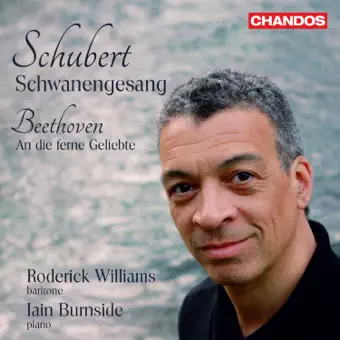juni 2020
Schubert: Schwanengesang - Beethoven: An die ferne Geliebte
Roderick Williams & Iain Burnside
Het uitstekende vermogen van Roderick Williams om met een persoonlijk tintje betekenis over te brengen, zorgt voor een gedenkwaardige Schwanengesang.

Toen ik onlangs Matthias Goerne's dodelijk serieuze Beethoven Lieder-cd (DG, 4/20) hoorde, bleef ik maar denken dat wat deze muziek echt nodig heeft Roderick Williams is en zijn altijd opgewekte behandeling van tekst. En hier is hij met pianist Iain Burnside, die Beethovens nauwkeurig geïntegreerde An die ferne Geliebte uitvoert samen met Schuberts discursieve, breed opgezette Schwanengesang.
Schubert is het hoofdevenement van de cd, een fascinerende, ongethematiseerde verzameling liederen die postuum niet door de componist maar door zijn uitgever werd getiteld, en die, hoewel veelvuldig opgenomen, geen standaard interpretatieve benadering heeft. Soms breidde de componist veel van zijn kenmerkende technieken uit; op andere momenten ging hij verder dan de sombere, muzikaal spaarzame terreinen van Winterreise. Terwijl sommige zangers Schwanengesang beginnen met de zwaardere Heinrich Heine-liederen, begint Williams met de meer op traditie gebaseerde Ludwig Rellstab-zettingen en van daaruit omvat hij met succes het enorme scala aan vocale eisen, schijnbaar met een sterkere identificatie met de uitbreidende artistieke vergezichten van deze muziek dan in zijn opname van Schuberts meer ingetogen Die schöne Müllerin (8/19).
Elke lyrische bariton zoals Williams speelt volgens andere regels dan Hans Hotter (Warner Classics), de ideale Wagneriaanse stem voor liederen zoals ‘Atlas’. In het grotere plaatje van Schwanengesang heeft Williams mooie tenorachtige kleuren goed gebruikt, maar roept hij ook, uit artistieke wilskracht, meer dan de noodzakelijke amplitude op voor de donkere confrontatie van ‘Der Doppelgänger’. Tegelijkertijd maakt Williams als componist ook coole beoordelingen van wat de muziek nodig heeft. Hoewel zijn ‘Der Doppelgänger’ net zo intens is als alle andere die ik heb gehoord, rekt hij het tempo niet op tot het breekpunt, met een timing (3'37") die minstens een minuut korter is dan uitvoeringen van Dietrich Fischer-Dieskau. Deze muziek is misschien Schubert die componeert op de rand van zijn wereld van begin 19e eeuw, maar het is nog steeds geen Shostakovich.
Wat taal betreft, zingt Williams Duits als een niet-moedertaalspreker in de beste zin van het woord, waarbij hij de woorden gebruikt met een gevoel van ontdekking van hoe veel dichter ze hem bij de archetypen in de verschillende coupletten brengen, waar hij bijzondere sympathie voor heeft. En het is op dit front dat zijn lezing van de Beethoven-cyclus schittert, met een gevoel voor de woorden dat voorkomt dat de meer strofisch gestructureerde nummers overbodig lijken, ondersteund door Burnsides gevoel voor rubato dat prachtig is vormgegeven naar de emotionele temperatuur die voorhanden is. Deze cd vervangt klassieke verslagen niet - zoals Goernes live-koppeling van hetzelfde repertoire met Alfred Brendel (Decca, 7/05), die John Warrack ‘een van de beste Lieder-partnerschappen van de dag’ noemde – maar ernaast staat. Williams vuurt hier op alle cilinders, waaronder een aantal waarvan ik niet wist dat hij ze had, en zijn trouwe bewonderaars zullen dit niet willen missen.

While recently hearing Matthias Goerne’s deadly serious Beethoven Lieder disc (DG, 4/20), I kept thinking that what this music really needs is Roderick Williams and his ever-buoyant treatment of text. And here he is with the pianist Iain Burnside, performing Beethoven’s meticulously integrated An die ferne Geliebte along with Schubert’s discursive, wide-ranging Schwanengesang.
Schubert is the disc’s main event, a fascinating unthemed collection of songs that was posthumously titled not by the composer but by his publisher, and which though widely recorded comes with no standard interpretative approach. At times, the composer expanded on many of his trademark techniques; at others, he went beyond the bleak, musically spare terrains of Winterreise. While some singers begin Schwanengesang with the weightier Heinrich Heine songs, Williams starts with the more tradition-based Ludwig Rellstab settings and from there successfully encompasses the huge range of vocal demands, seemingly with stronger identification with this music’s expanding artistic vistas than in his recording of Schubert’s more contained Die schöne Müllerin (8/19).
Any lyric baritone such as Williams plays by different rules from the likes of Hans Hotter (Warner Classics), the ideal Wagnerian voice for songs such as ‘Atlas’. In the larger picture of Schwanengesang, Williams has lovely tenor-ish colours put to good use but also summons, out of artistic willpower, more than the necessary amplitude for the dark confrontation of ‘Der Doppelgänger’. At the same time, Williams the composer is also making cool assessments of what the music needs. Though his ‘Der Doppelgänger’ is as intense as any I’ve heard, he doesn’t stretch the tempo to breaking point, with a timing (3'37") that’s at least a minute shorter than performances by Dietrich Fischer-Dieskau. This music may be Schubert composing on the edge of his early 19th-century world, but it’s still not Shostakovich.
On language matters, Williams sings German as a non-native speaker in the best sense, harnessing the words with a sense of discovery of how much closer they bring him to the archetypes within the various verses, to which he brings particular sympathy. And it’s on this front that his reading of the Beethoven cycle shines, with a feeling for the words that keeps the more strophically structured songs from seeming redundant, supported by Burnside’s sense of rubato that’s beautifully fashioned to the emotional temperature at hand. This disc doesn’t displace classic accounts – such as Goerne’s live pairing of the same repertoire with Alfred Brendel (Decca, 7/05), which John Warrack called ‘one of the great Lieder partnerships of the day’ – but stands beside them. Williams fires on all cylinders here, including some I didn’t know he had, and his longtime admirers won’t want to miss this.
